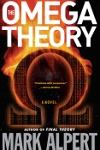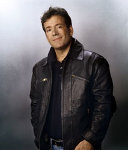The Omega Theory by Mark Alpert
 By Lori Andrews
By Lori Andrews
Mark Alpert is someone I’d want on my side in any number of treacherous situations—from being stranded in a desert with a megalomaniac who is about to end the world to being on the receiving end of a laser death saber. After all, if the Apocalypse were upon me, why not turn to someone whose Princeton study of Einstein might be able to help us alter the time-space continuum? Why not call upon someone who has written about particle physics and gadgets and human behavior for a wide range of publications? Who could resist someone who serves on Scientific American’s softball team, the Big Bangers?
Forget MacGyver. I want Alpert.
Mark entered the thriller scene in 2008 as a celebrated ITW newbie with his book Final Theory. The novel’s hero, David Swift, is called to the hospital to comfort his dying mentor, a physicist who’s been brutally tortured. As a young scholar fifty years earlier, the physicist had been an assistant to Albert Einstein. On his deathbed, the physicist says two words in German. Einheitliche Feldtheorie. The fabled Unified Field Theory, the explanation for all natural phenomena, which Einstein sought throughout his life. Within hours of hearing his mentor’s last words, David is running for his life. The FBI and a ruthless Russian mercenary are vying to get their hands on the long-hidden theory with staggering consequences.
Published by Touchstone in 2008, Final Theory was hailed as one of the best thrillers of the year by Booklist, Borders and the American Booksellers Association. Foreign rights to the novel were sold in more than twenty languages, and the movie rights were acquired by Radar Pictures, a Los Angeles production company.
Alpert continues the saga of the Theory of Everything in his second book, The Omega Theory (February 2011). The sequel opens with the news that Iran has tested a nuclear bomb. But this blast is far more dangerous than any previous nuke. It triggers a fundamental disruption in space and time, something that hasn’t occurred since the Big Bang 14 billion years ago. Scientists have long speculated that the laws of the universe were akin to a computer code. And, in Mark’s new book, a group of religious fanatics want to end the world by shutting down the program.
Mark’s interest in high level physics as the backdrop to political intrigue has its roots in a long-time obsession with Einstein. Mark’s ability to explain science to the public was honed by writing articles and serving as a Contributing Editor for Scientific American. In fact, for Mark, writing about emotions and motivations can be more challenging than explaining super colliders, dark matter, or ion computing.
 Mark is constantly collecting information for plot lines, settings, and characters. When I asked another mystery writer what research he’d undertaken for his books, he told me, “Once I went to a drug store and looked at a gun magazine.” Mark is on the other end of the research spectrum. He’s discussed the possibility of cold fusion with Arthur C. Clarke in Clarke’s room at the Chelsea Hotel, visited government labs undertaking high level physics experiments, and spent time in exotic settings to assure the realism of his books’ descriptions.
Mark is constantly collecting information for plot lines, settings, and characters. When I asked another mystery writer what research he’d undertaken for his books, he told me, “Once I went to a drug store and looked at a gun magazine.” Mark is on the other end of the research spectrum. He’s discussed the possibility of cold fusion with Arthur C. Clarke in Clarke’s room at the Chelsea Hotel, visited government labs undertaking high level physics experiments, and spent time in exotic settings to assure the realism of his books’ descriptions.
The scientific credibility of his work is so strong that a university in Germany organized a whole conference to discuss the physics in his thriller Final Theory. The conference paired Mark with a German physicist whose work on neutrinos Mark had mentioned in his novel. As opposed to the trickle of people who typically attend book signings, hundreds of scholars and students attended the conference.
In Germany, Final Theory was published with a German title meaning “God’s Dice,” a nod to a quote from Einstein’s letter to a colleague: “Quantum mechanics is certainly imposing. But an inner voice tells me that it is not yet the really thing. The theory says a lot, but does not really bring us any closer to the ‘old one.’ I, at any rate, am convinced that He does not throw dice.”
When I think of Mark, I think of another of Einstein’s quotes, this time a message to his son: “Life is like riding a bicycle. To keep your balance you must keep moving.” Mark is constantly in motion, both creatively and literally. One day, he might be at the University at Maryland, looking at the ion trapping devices and laser beams essential to quantum computers. The next day, you can catch him reading about autism (Omega Theory opens with the kidnapping of David’s adopted son—a young descendent of Einstein who has autism).
Because Omega Theory involves the preparations for a sneak attack on an Iranian nuclear facility, Mark explored Turkmenistan, the Central Asian country north of Iran. Accompanied by a Turkmen guide and driver, he traveled for hours up and down sand dunes until they arrived at Burning Gas Crater of Darvaza , which the Turkmen people call “The Door to Hell.” The crater is in the Karakum Desert, which contains some of the largest natural-gas reserves in the world.
“It’s as big as a football field, almost a hundred yards wide, and it’s filled with jets of flaming methane, which vent from a pocket of natural gas below the surface,” says Mark. “The crater is the result of an industrial accident that occurred forty years ago, when Turkmenistan was part of the Soviet Union. A drilling rig collapsed in the sand. As I approached the crater’s rim to get a better look at the flames, my guide yelled, ‘No! Don’t get too close! The edge will crumble and you’ll fall into the fire!’ And I thought, This is perfect. You couldn’t ask for a better setting for a science thriller.”
Mark’s training for thriller writing began at an early age. “When I was a kid I had incredibly elaborate daydreams,” he says. “I used to imagine that my neighborhood in Queens, New York, was a post-apocalyptic world that had regressed to a medieval state and 108th Street was the borderline between two warring kingdoms and I was constantly running from one threat or another.”
Mark was drawn to writing thrillers because “I can be each of the characters in the story, both the good guys and the bad, and best of all, my fictional avatars are smarter, braver, stronger, and sexier than I could ever hope to be in real life.”
I think Mark is selling himself short. He’s as interesting and talented as his characters. And if I am stuck in Queens in an impending Apocalypse, I want Mark Alpert watching my back.
Lori Andrews is the author of the Dr. Alexandra Blake thrillers, the latest of which is Immunity. She’s the subject of an extensive profile in the February 2011 Chicago Magazine, in which she is posed with a UFO and three white mice (go figure).
- The Omega Theory by Mark Alpert - January 31, 2011
- Scoop to Kill by Wendy Lyn Watson - September 9, 2010
